Good afternoon, ladies and gentlemen. Thank you to Major Barrett Dill and the Hamilton Rotary for inviting me to give a talk to your members and listening audience about Greenrock and how we can all make meaningful change in Bermuda by adopting sustainable lifestyle choices.
Question for the Audience
- How many people have heard about Greenrock?
- How many know about the Government’s Sustainable Development Plan?
- How many people, and let’s be honest, know what sustainable development is?
 To understand what Greenrock is trying to do in Bermuda, it’s important to have a clear understanding of what the current Government has proposed and what sustainable development means in both a theoretical and, more importantly, in a Bermuda context.
To understand what Greenrock is trying to do in Bermuda, it’s important to have a clear understanding of what the current Government has proposed and what sustainable development means in both a theoretical and, more importantly, in a Bermuda context.
What is sustainable development from a theoretical perspective? Quite simply, it’s the art of developing solutions for challenges using a triple bottom-line perspective. Where your solution takes into perspective how it will benefit society, the environment and the economy. By doing this, in theory, you will create a just, efficient and healthy community; a state of balance that everyone can enjoy for generations to come.
Putting this theory into practice in Bermuda requires Government policy and willingness, along with support and understanding of individuals and companies. In order to understand where Bermuda stands today, it’s important to give a little background. 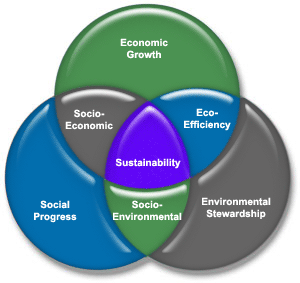
Since 2005 Greenrock has being studying this issue and establishing relationships with experts in the field of renewable energy, urban planning, healthy living and sustainable development. Much of our work is centered on Bermuda’s Sustainable Development Plan, which was drafted by Alex Scott’s government in 2005 and finally implemented in 2008.
To build this Plan required a lot of time, research, dedication, as well as public funding. Both the private and public sectors were consulted in order to help narrow down the themes and identify the objectives of this Plan. In addition to coming up with objectives, this Plan outlines actions steps as well as the challenges each action step must overcome in order to be completed.
The Plan is broken down into five:
1. Building and Maintaining an Inclusive Strong Economy
2. Transforming Governance and the Public Sector
3. Protecting and Enhancing our Environment and Natural Resources
4. Sustaining our Communities
5. Living within Bermuda’s Limits
To support the Plan and to make it more pragmatic and part of Government’s decision-making process, a special unit was formed within the Cabinet Office called the Sustainable Development Unit (SDU). The SDU is responsible maintaining the accuracy of this document and ensuring the objectives of this Plan are applied during the drafting of government policy or when Cabinet is considering any capital expenditures.
Greenrock applauds Government in the drafting of the Plan and introducing this initiative to Bermuda. In theory, both the formation of the SDU and the Plan make good sense and are a good start. However, as it currently stands, the success of this Plan is dependent on whether the leadership within Government is committed to following its own guidelines.
Unfortunately, if you look at the last three years, there has been a series of actions which begs the question of whether this objective of transforming Governance is actually being met by the current Government administration.
For example, at the time this draft Plan was being showcased to the general public, a question was raised to the panel at the third Public Town Hall Meeting. The question asked whether it was true that the Government had chosen the Botanical Gardens for the new hospital site and had begun work on developing the plans for this new development on an existing greenfield site.
Other concerns are:
- Relying on an outdated Bermuda (Development) Plan and not making the necessary updates within the 6-year review cycle
- Extensive use of Special Development Orders (SDOs) to approve construction projects, thus bypassing the development applications review process and, more importantly, avoiding any environmental impact studies (EIS) or public consultation
- Increase development of protective areas or greenfield sites before brownfield sites
- Converting hotels, cottage colonies or single dwelling properties into multi-dwelling complex without a thorough EIS (that is, impact on traffic, solid waste, energy consumption, water consumption, flash flooding)
- A slow response to developing a National Energy Policy despite numerous request by outside parties to do so
- Lack of revisions to the Bermuda Custom Tariff Act to provide economic incentives to import proven energy efficient and environmentally friendly technologies and products
Greenrock understands that change of this kind does not occur overnight. And change has been further stymied by numerous leadership shake ups and the recent general election fallout; indeed politics can get in the way of progress on any Government initiative.
Plus, each Cabinet minister (whether existing or recently appointed) has a number of priorities outside of trying to learn about their Government’s Sustainable Development Plan. Unlike an Act that has been sworn into law by Parliament, this Plan is only a policy and can easily be changed, cancelled or even ignored by the existing or future Governments if they so desire.
With that said, this is why it’s imperative for the community to ensure that Government does not falter on this promise to uphold these guidelines and to make this Plan sustainable despite the inevitable changes in politics.
That is why Greenrock has been working on educating both the private and public sectors about making meaningful change in our community through sustainable lifestyle choices. With the financial support of individual and corporate patrons, we will continue our crusade to persuade individuals, companies and Government to do their part in making the objectives this Plan become relevant and meaningful in day-to-day life.
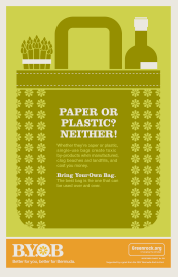 Greenrock has initiated a number of things to meet its goal of ‘Changing the Mindset’ in Bermuda. At the beginning of 2007, Greenrock introduced the BYOB reusable shopping bag to Bermuda. Our goal was to help reduce the amount of plastic and paper shopping bags handed out by grocery stores. In doing this, a win-win solution was created for both the grocery store and individual. The individual consumer had a better way of carrying their groceries as well as a bag that could be reused for other purposes. Grocery stores found an easier way to bag groceries while reducing the cost and storage of plastic and paper bags. And, most importantly, the reusable bag would make a positive impact by lowering waste and reducing our contribution to global warming.
Greenrock has initiated a number of things to meet its goal of ‘Changing the Mindset’ in Bermuda. At the beginning of 2007, Greenrock introduced the BYOB reusable shopping bag to Bermuda. Our goal was to help reduce the amount of plastic and paper shopping bags handed out by grocery stores. In doing this, a win-win solution was created for both the grocery store and individual. The individual consumer had a better way of carrying their groceries as well as a bag that could be reused for other purposes. Grocery stores found an easier way to bag groceries while reducing the cost and storage of plastic and paper bags. And, most importantly, the reusable bag would make a positive impact by lowering waste and reducing our contribution to global warming.
On our website, we provided proven facts on the amount of energy, chemicals and waste typically consumed in producing and distributing plastic and paper shopping bags. This information was a valuable resource used by local media in helping to raise awareness of these facts. By the third quarter of 2007, consumers in Bermuda bought over 2,000 reusable bags from Greenrock.
Grocery stores in Bermuda started to see this change in consumer behavior and recognised the opportunity to reduce the cost of purchasing and storing of paper and plastic shopping bags. Lindo’s Group of Companies was the first to partner with Greenrock on this initiative and publicised their decision to endorse the use of reusable bags in their stores and move away from offering paper shopping bags and reduce the use of plastic bags.
In another project, we partnered with HWP, BELCO and GE for a Bulb Swap campaign where anyone could exchange two used incandescent bulbs for two brand new GE Compact Fluorescent Lightbulbs (or CFLs). The simple act of using a CFL in your home or office would save energy while saving you money. The primary goal of this project was to target those people who could not afford the cost of a CFL, had never heard of a CFL, or had never used a CFL in their home. Close to 1,000 people participated in this event and just under 80% of those people admitted to not using a CFL in their home. By raising awareness of the CFL, Greenrock was also able to work with two branches of Government, Consumer Affairs and Works and Engineering, to help communicate any concerns about the safe operation of CFLs as well as to publicise how CFLs should be handled and correctly disposed of in Bermuda.
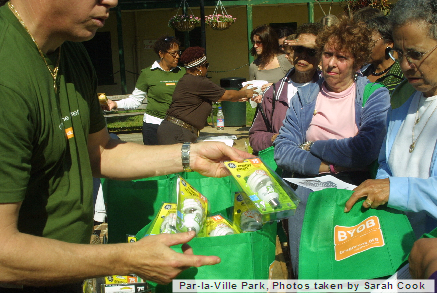 Several positive outcomes can be traced back to this project. Greenrock has found that more people are aware of the benefits of CFLs, including the announcement by Government to replace regular incandescent bulbs in Government offices and building with CFLs. Plus, as the demand for CFLs has grown and more stores are selling CFLs in Bermuda, the variety of bulb types has grown and the unit cost has dropped, making them more affordable for most consumers.
Several positive outcomes can be traced back to this project. Greenrock has found that more people are aware of the benefits of CFLs, including the announcement by Government to replace regular incandescent bulbs in Government offices and building with CFLs. Plus, as the demand for CFLs has grown and more stores are selling CFLs in Bermuda, the variety of bulb types has grown and the unit cost has dropped, making them more affordable for most consumers.
In the summer of 2007, Greenrock hosted the first ‘Green’ music festival showcasing Heather Nova and many of her friends who were international recording artists. This was the first large public event held at the Arboretum (another greenfield site that Government considered for the building the new hospital). At this event, Greenrock used biodiesel to run the electric generator s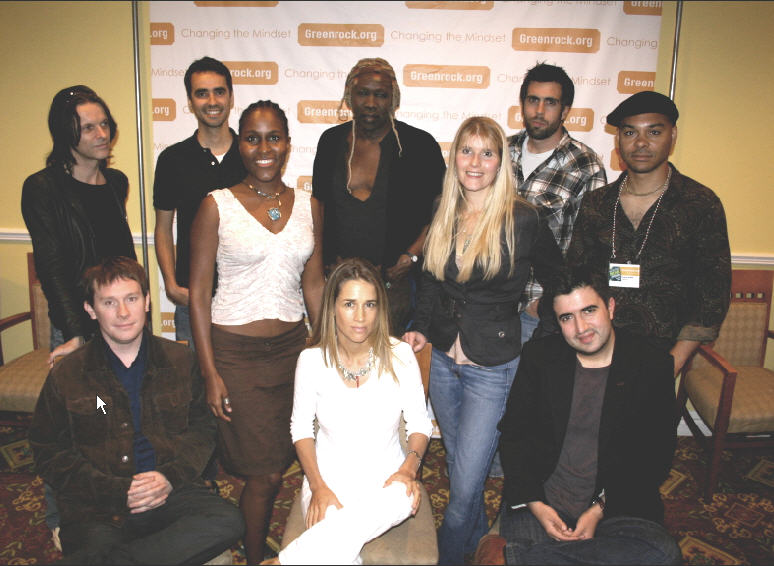 upplying power for the whole event; food and beverage vendors had to serve food using biodegradable cups, plates and utensils; and we developed waste stations where waste would be separated in three bins marked garbage, recyclables and compost.
upplying power for the whole event; food and beverage vendors had to serve food using biodegradable cups, plates and utensils; and we developed waste stations where waste would be separated in three bins marked garbage, recyclables and compost.
As a result of this event, there are now two large suppliers of biodegradable picnicware, a local biodiesel supplier who is certified by the Environmental Protection department, an established process within Works and Engineering to arrange for pick up of compost waste, and an increase in usage of waste stations that help separate garbage from compost and recyclables at the time waste is collected. Pre-waste separation is a more practical and cost-effective method than post-waste collection and sorting.
As publicity around Greenrock continues to increase, we are constantly being asked to help organisations make their events greener, in keeping with sustainable development. For example, the organisers of the Bermuda End-to-End wanted to reduce the amount of single-use, plastic water bottles used for the event. Greenrock introduced the idea of reusable water bottles and water filling stations, which helped to eliminate close to 15,000 plastic bottles of waste and reduce the event’s contribution to global warming. Furthermore, End-to-End realised a budget savings of $13,000. In 2008, this event attracted nearly 6,000 people, allowing Greenrock to inform people about the economic, environmental and health benefits of using safe, reusable bottles instead of the single-use plastic bottle.
 When it comes to transportation, we have helped beta test two electric scooter models and provided valuable feedback and direction to the current distributors of electric scooters on the island. We have also written articles for the local media and have posted commentary on our website regarding the debate on which vehicle type is more sustainable for Bermuda: hybrid, alternative-fuelled vehicles or all-electric vehicles. We are continually looking at urban planning models and techniques adopted from other countries to see if we can reduce traffic congestion in and out of Hamilton. However, the challenge is trying to find a solution that accepts the reality that Hamilton will always be the central commercial district for Bermuda.
When it comes to transportation, we have helped beta test two electric scooter models and provided valuable feedback and direction to the current distributors of electric scooters on the island. We have also written articles for the local media and have posted commentary on our website regarding the debate on which vehicle type is more sustainable for Bermuda: hybrid, alternative-fuelled vehicles or all-electric vehicles. We are continually looking at urban planning models and techniques adopted from other countries to see if we can reduce traffic congestion in and out of Hamilton. However, the challenge is trying to find a solution that accepts the reality that Hamilton will always be the central commercial district for Bermuda.
When it comes to energy supply and usage, Greenrock is helping to encourage local entrepreneurs who want to become a part of the new green economy by creating ventures that would supply micro-renewable energy systems to Bermuda. These systems utilise innovations in photovoltaic solar, solar thermal, and wind turbines and would be at a scale and cost suitable for commercial and home applications. These micro-renewable systems could help counter the escalating cost of energy in Bermuda while limiting our emissions that contribute to global warming.
On a larger scale, Greenrock is providing feedback to Government during the drafting stages of our first national energy plan. An energy plan needs to exist in Bermuda to provide the vision and guidance to ensure that our energy supply and usage is affordable, accessible and sustainable for everyone living on the island today and into the future. Greenrock has enjoyed open dialogue with BELCO, the Ministry of Energy and several other interested parties, exploring how we can move from a central power supply tied to oil to an active power distribution model that includes large- and small-scale renewable energy sources. In so doing, we hope to see a more robust power grid where the supply of power comes from multiple sources and is actively managed to improve redundancy and reduce lengthy blackouts due to natural disasters, demand surges or line faults.
By examining energy, Greenrock is trying to address all sides of the issue. The  supply of energy is one aspect, and the demand and usage of energy is the other side. Greenrock is a strong advocate for energy conservation and efficiency. Energy conservation is the first line of attack when it comes to managing our cost of energy and the amount of pollution generated from our energy production. It has been scientifically proven that local community-based initiatives to conserve energy usage can make a meaningful contribution in terms of lowering the cost of energy and reducing carbon emissions.
supply of energy is one aspect, and the demand and usage of energy is the other side. Greenrock is a strong advocate for energy conservation and efficiency. Energy conservation is the first line of attack when it comes to managing our cost of energy and the amount of pollution generated from our energy production. It has been scientifically proven that local community-based initiatives to conserve energy usage can make a meaningful contribution in terms of lowering the cost of energy and reducing carbon emissions.
Energy conservation needs to go beyond consumer behavior and must become embedded into our government policy, our local economics, and the way we run our lives. Bermuda is unique to most countries in that we import everything and so we can easily create economic incentives through duties to stimulate positive consumption. We could levy higher duties on goods that are more harmful to our environment, that are not energy efficient, and are not sustainable. For that reason, in late 2007, Greenrock submitted an extensive list of recommended changes to the 2006 Bermuda Customs Tariff Act and is pushing for these recommendations to be added to the current redrafting of that Act.
Due to Bermuda’s limited land mass and over development, one of the most crucial Government policy documents under review today is the Draft 2008 Bermuda (Development) Plan. This Plan is the guide from which Development Application Board (DAB) reviews the merits of development applications submitted to the Dept of Planning.
The last development plan was completed in 1992 and should have been updated in 1998. But due to a historical election year, the process was delayed indefinitely and was sadly overdue. Since 1994, the DAB has been using antiquated guidelines, exposing the application process to more influences and compromise (such as the extensive use of SDOs) than it would have if there were a solid development plan.
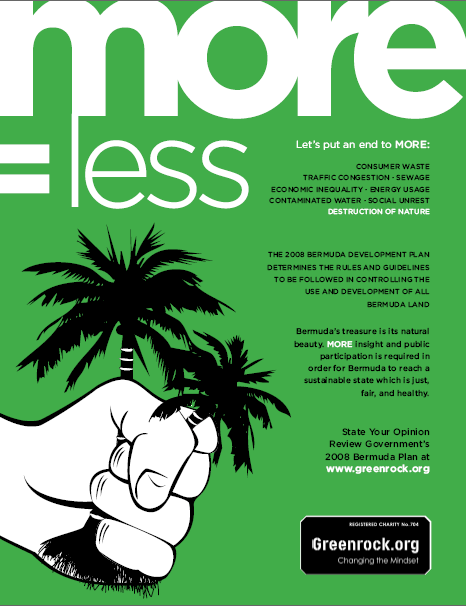 Greenrock is not against progress when it comes to improving buildings and overall infrastructure, but there needs to be some assurance to the people of Bermuda that this will be done in a smart, sustainable way for future generations. As I speak, we are running a newspaper and viral-web campaign citing the importance of this document and giving reasons on why the community needs to be engaged in the redrafting of this Plan. Greenrock has partnered with the Bermuda National Trust and other NGOs to ensure that this new Draft is comprehensive and includes guidelines to ensure sustainable practices are applied to existing and future development projects.
Greenrock is not against progress when it comes to improving buildings and overall infrastructure, but there needs to be some assurance to the people of Bermuda that this will be done in a smart, sustainable way for future generations. As I speak, we are running a newspaper and viral-web campaign citing the importance of this document and giving reasons on why the community needs to be engaged in the redrafting of this Plan. Greenrock has partnered with the Bermuda National Trust and other NGOs to ensure that this new Draft is comprehensive and includes guidelines to ensure sustainable practices are applied to existing and future development projects.
Our educational effort in Bermuda has been growing and is structured to a community-based focus. Since 2005, we have been running educational forums on global warming and recycling. We are about to embark on a School Road Show for the 2008-09 academic year, mostly targeting students from middle and senior schools. The goal of this road show is to educate the future citizens of Bermuda on what sustainable development is and to provide practical examples of what is being done or can be done in our community.
Over the last year and half, Greenrock has been conducting boardroom discussions with companies and organisations about creating a ‘Green Office ’. From this initiative, companies have quickly realised that going Green creates operation efficiency and cost savings, while fostering higher staff morale due to healthier workspaces and knowledge that the company is trying to have a positive environmental impact on Bermuda.
 More can be done and Greenrock is continually working on new ideas and projects. Our management team comprises individuals who provide diverse insight into our local community. We consult with experts from Harvard, MIT and UC Berkeley as well as a number of local and international NGOs. We have an advisory panel made up of individuals who are strong supporters of sustainable development and are interested in the long-term prosperity of Bermuda.
More can be done and Greenrock is continually working on new ideas and projects. Our management team comprises individuals who provide diverse insight into our local community. We consult with experts from Harvard, MIT and UC Berkeley as well as a number of local and international NGOs. We have an advisory panel made up of individuals who are strong supporters of sustainable development and are interested in the long-term prosperity of Bermuda.
Greenrock is a charity relying on volunteers to get things done. We could truly benefit from a steady flow of funds from individual or corporate patrons as this would provide the basis to help us build a more dynamic and full-time infrastructure to ensure the interests of the community are closely monitored. As a member of the Centre of Philanthropy, Greenrock prides itself on having good governance, access to information and prudent financial bookkeeping.
Greenrock urges Bermuda to contribute to our ‘Changing the Mindset’ fund to help continue our work in the community and maintain our web presence. By being part of the International Charity Fund of Bermuda (ICFB), any donations received by the ICFB for Greenrock from US companies or citizens can be eligible for tax deduction. Click on Patron to learn more on how you can contribute to our efforts.
In closing, I’ve used this quote in some of the presentations I’ve made in the last two years. The reason I find this quote interesting is that it was made by the London Department of Trade and Industry in May 1999. The quote is as follows:
We are now going through a sustainability revolution that will rival the agricultural and industrial revolutions in the way it will transform society … Innovation and creativity will be needed to develop radical, new products and processes that are less damaging to the environment and generate new businesses and jobs.
I truly believe that Bermuda has the opportunity of making itself an idyllic place - the envy of other countries and islands - to live and work. However, this all depends on the whether we can make the right sustainable lifestyle choices today.

